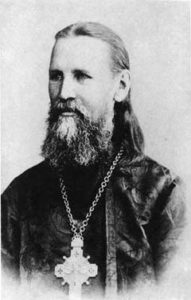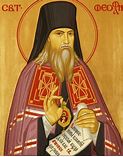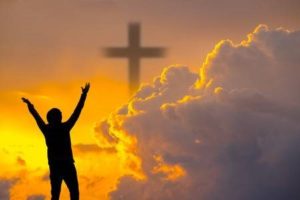SSCORRE!
Saint Sophia Cathedral
Online Resources for our Religious Edification
Topic of the Week – Do Orthodox Christians celebrate Halloween?
“…Where secular people may feel they have the option to divorce the spiritual realm from the physical and do one thing with their bodies while believing another in their minds, we Christian people do not. We know that the actions of our bodies, and the things we do with our lives, affect our hearts and are directly connected to spiritual realms of which we are, on account of our weakness, not always immediately aware….”
Excerpted from A Brief Word on Halloween from Bishop Irenei, as to Whether Orthodox Christians Ought to Participate
Adult/Family
Halloween is quickly approaching at the end of this month. Please read this extract of a letter, written in 2012, from Bishop Irenei of London and Western Europe to a mother and father regarding whether Orthodox Christians should participate in the secular activities associated with that day.
Some will say, “Ah, but it is only a bit of fun, these days. It’s just fancy dress. No one believes in these things!” But tell me, do you think the devil is so foolish that he does not see the opportunity that comes from something being perceived as “just fun and games”? Do you believe he does not understand that such circumstances cause us to let down our guard, to tease and toy with the very ideas of demons and spiritual darkness? That he does not rejoice precisely because such images become things of play, and therefore things that we do not guard against when the play is done?
Yet others will say, “But it is not all macabre: children trick-or-treat in costumes of angels, of cartoon characters, of animals.” But this is to fail to see the point that it is the very admixture of these two things — the playful and the demonic — that does such damage to the soul. The Scriptures say, What concord hath Christ with Belial? (2 Cor. 6.15), and yet modern man feels perfectly comfortable to join the demons to teddy-bears and unicorns; to mix the sinister with the trivial. This is because he has lost the sense of how powerfully our idle “play” affects the inner disposition of the heart. We think that if we don’t take something “seriously”, it cannot seriously affect us—but look how much woe and despair there is in the world, as the result of this delusion!
May God give you strength to stand steadfast with joy amidst these worldly trials! May He bless you, and bless your children.
After reading this article, what activities will you choose to do with your family on that day this year?
(* Old Calendar Orthodox celebrate the feast day of St. John of Kronstadt on November 1.)
Preschool/Elementary
St. John of Maximovitch was a very holy priest and he taught his parishioners to not celebrate the holiday of Halloween since it was not a church holiday and that they should be in church, worshipping to prepare for the feast day the next day. Listen to this short life of St. John Maximovitch: St. John Maximovitch of Shanghai and San Francisco
Here are some books you can buy to read and learn about the life of St. John Maximovitch:
An Orthodox Child’s Activity Book: In Honor of Saint John of Shanghai and San Francisco
Middle School
Watch this video to learn about what Saint John Maximovitch did when some people of his congregation chose to attend a Halloween party instead of attending service at church. Fr. Seraphim Rose and St. John Maximovitch: on Halloween – YouTube
What did he do? Why did he do it? How do you think it affected the people who had attended the party? Do you think they went to a party or church the next year on Halloween? Why do you think this?
Buy this book to read more about his life: LIFE OF ST. JOHN, WONDERWORKER OF SHANGHAI AND SAN FRANCISCO – Saint Nectarios Press and Book Center (stnectariospress.com)
High School
Concerning Halloween
… we must carefully examine every aspect of our involvement in the world – its activities, festivals, associations, and societies – to be certain whether or not these involvements are compatible with our Holy Orthodox Faith. This difficult task can lead to some pain when we realize that we cannot take part in some popular organizations and activities.
Most of our schools, local community organizations, and entertainments in television, radio and the press will share in and capitalize upon the festival of Halloween. But Orthodox Christians cannot participate in this event at any level. The simple issue – Fidelity to God and the Holy Orthodox Christian Faith.
Halloween has its roots in paganism, and it continues as a form of idolatry to worship Satan, the angel of death. As we know, the very foundation of our Holy Church is built upon the blood of martyrs who refused despite painful penalties to worship, venerate, or pay obeisance in any way to the idols who are Satan’s angels. Because of the faithfulness, obedience, and self-sacrifice of the Holy Martyrs, God poured out abundant Grace upon His Holy Church, whose numbers increased daily. The persecution did not stem the spread of faith. Differing from the world’s values, humble faithfulness and obedience to God were the very strength of their life in Christ, Who gave them true spiritual peace, love and joy, and participation in the miraculous workings of His Holy Spirit. Therefore, the Holy Church calls us to faithfulness by our turning away from falsehood toward Truth and eternal life.
We can stay away from the pagan festival of Halloween if we understand the spiritual danger and history of this anti-Christian feast.
The feast of Halloween began in pre-Christian times among the Celtic peoples who lived more than 2,000 years ago in what is now the United Kingdom, Ireland, and northern France. These pagan peoples believed that physical life was born from death. Therefore, they celebrated the beginning of the “new year” in the fall (on the eve of October 31 and into the day of November 1), when, as they believed, the season of cold, darkness, decay and death began. The Celts believed that a certain deity, whom they called Samhain, was the lord of death. To him they gave honor at their New Year’s festival.
From an Orthodox Christian point of view, many diabolical beliefs and practices were associated with this feast, which have endured to this current time. On the eve of the New Year’s festival, the Druids, who were the priests of the Celtic cult, instructed their people to extinguish all hearth fires and lights. On the evening of the festival they ignited a huge bonfire built from oak branches, which they believed to be sacred. Upon this fire, they offered burnt sacrifices of crops, animals, and even human beings to appease and cajole Samhain, the lord of death. They also believed that Samhain, being pleased by their faithful offerings, allowed the souls of the dead to return to homes for a festal visit on this day. This belief led to the ritual practice of wandering about in the dark dressed in costumes indicating ghosts, witches, hobgoblins, fairies and demons. The living entered into fellowship and communion with their dead by this ritual act of imitation, through costume and the wandering about in the darkness, even as the souls of the dead were believed to wander.
The dialogue of “trick-or-treat” is integral to Halloween beliefs and practices. The souls of the dead had – by Celtic tradition – entered into the world of darkness, decay, and death, and made total communion with and submission to Samhain, the lord of death. They bore the affliction of great hunger on their festal visit. This belief brought about the practice of begging as another Celtic ritual imitation of the activities of the souls of the dead on their festal visit. The implication was that any souls of the dead and their imitators who are not appeased with “treats”, i.e. offerings, will provoke the wrath of Samhain, whose angels and servants (the souls and human imitators) could retaliate through a system of “tricks” or curses.
The Orthodox Christian must understand that taking part in these practices at any level is an idolatrous betrayal of our God and our Holy Faith. For if we imitate the dead by dressing up in or wandering about in the dark, or by begging with them, then we have willfully sought fellowship with the dead, whose Lord is not a Celtic Samhain, but is Satan the Evil One, who stands against God. Further, if we submit to the dialogue of “trick-or-treat,” our offering goes not to innocent children, but rather to Samhain, the Lord of Death whom they have come to serve as imitators of the dead, wandering in the darkness.
We must stay away from other practices associated with Halloween, the eve of the Celtic New Year festival. The Druid priests used to instruct their faithful to extinguish their hearth fires and lights and to gather around the fire of sacrifice to make their offerings and to pay homage to the Lord of Death. This sacred fire was the fire of the new year, to be taken home to rekindle lights and hearth fires. The sacred New Year’s fire developed into the practice of the Jack-o’-lantern (in the U.S.A. a pumpkin, in older days other vegetables were used), which was carved in imitation of the dead and used to convey the new light and fire to the home, where the lantern was left burning throughout the night. Even the use and display of the Jack-o’-lantern honors the Samhain, the Celtic god of death. Orthodox Christians cannot share in this Celtic activity, but must counter the secular customs by instead burning candles to the Savior, the Most Holy Mother of God, and to all the Holy Saints.
….The Halloween festival was the proper night for sorcery, fortune telling, divination, games of chance, and Satan worship and witchcraft in the later Middle Ages.
In the strictly Orthodox early Celtic Church, the holy Fathers tried to counteract this pagan new year festival that honored the Lord of Death, by establishing the Feast of All Saints on the same day. (It differs in the East, where the Feast of All Saints is celebrated on the Sunday following Pentecost). The custom of the Celtic Church was for the faithful Christians to attend a vigil service and a morning celebration of the Holy Eucharist. This custom created the term Halloween. The Old English of All Hallow e’en, i.e., the eve commemorating all those who were hallowed (sanctified) became Halloween.
The remaining pagan and therefore anti-Christian people, whose paganism had become deeply intertwined with the Occult, Satanism and Magic, reacted to the Church’s attempt to supplant their festival by increased fervor on this evening. The early medieval Halloween became the supreme feast of the Occult, a night and day witchcraft, demonism, sorcery and Satanism of all kinds. Many practices involved desecration and mockery of Christian practices and beliefs. Costumes of skeletons developed as a mockery of the Church’s reverence for Holy Relics; Holy things were stolen, such as crosses and the Reserved Sacrament, and used perversely in sacrilegious ways. The practice of begging became a system of persecution to harass Christians who were, by their beliefs, unable to participate with offerings to those who served the Lord of Death. The Western Church’s attempt failed, to supplant this pagan festival with the Feast of All Saints….
Paganism, idolatry and Satan worship–How then did things so contradictory to the Holy Orthodox Faith gain acceptance among Christian people? The answers are spiritual apathy and listlessness, which are the spiritual roots of atheism and turning away from God.
In society today, one is urged to disregard the spiritual roots and origins of secular practices when the outward practices or forms seem ordinary, entertaining, and harmless. The dogma of atheism underlies many of these practices and forms, denying the existence of both God and Satan.
Practices and forms of obvious pagan and idolatrous origin are neither harmless nor of little consequence. The Holy Church stands against them because we are taught by Christ that God stands in judgment over everything we do and believe, and that our actions are either for God or against God. Therefore, the customs of Halloween are not innocent, but are demonic, precisely as their origins prove.
There are evil spirits. Devils do exist. Christ came into the world so that, through death, He might destroy him that had the dominion of death, that is, the Devil (Hebrews 2:14). Christians must see that our greatest foe is the Evil One who inspires nations and individuals to sin, and who keeps them from coming to the truth. Until we know that Satan is our real enemy, we can make little spiritual progress. For our struggle is not against flesh and blood, but against principalities, against powers, against the world rulers of the darkness of this age, against the spiritual hosts of wickedness in the heavenly places (Ephesians 6:12).
Today we witness a revival of satanist cults and special satanic ceremonies on Halloween night. Everywhere Satan reaches out to ensnare more innocent people with spiritualism, supernatural phenomena, seances, prophesies and all sorts of demonically inspired works.
Divine Providence ensured that St. John of Kronstadt*, that physician of our souls and bodies, should have his feast day on the very day of Halloween, a day the world dedicated to the destroyer, corrupter, and deceiver of humanity. God has provided us with this powerful counterpoise and weapon against the snares of Satan, and we should take full advantage of this gift, for truly God is wonderful in His Saints.
Excerpted from Concerning Halloween (*Orthodox on the Old Calendar celebrate the feast day of St. John of Kronstadt on November 1.)
Is Halloween a harmless practice? Why or why not? Who is our real enemy? How does participating in Halloween support this enemy and not our salvation?
What will you choose to do this year on Halloween?
_____________________________________________________________________________________________________________________________________________
A Message from Maria Spanos
I am passionate about our Orthodox Christian faith and seek to help others learn as much as they can about it. My purpose here is to share online resources that help strengthen our relationship with Christ and bind us closer to His Church. I believe they are invaluable in learning about our precious Orthodox Tradition, and are a great aid for teaching family members, friends and others about Orthodoxy. ~Maria
Two of my favorite quotes:
 “A true Christian behaves in this life so that it may be a preparation for the future one and not only a life here below. In his actions, he does not think what will be said of him here but of what will be said there in heaven; he represents to himself that he is always in the presence of God, of the angels and all the saints, and remembers that someday they will bear witness of his thoughts, words, and deeds.” — Saint John of Kronstadt
“A true Christian behaves in this life so that it may be a preparation for the future one and not only a life here below. In his actions, he does not think what will be said of him here but of what will be said there in heaven; he represents to himself that he is always in the presence of God, of the angels and all the saints, and remembers that someday they will bear witness of his thoughts, words, and deeds.” — Saint John of Kronstadt
__________________________________________________________

“Of all the holy works, the education of children is the most holy.”
— St. Theophan the Recluse







